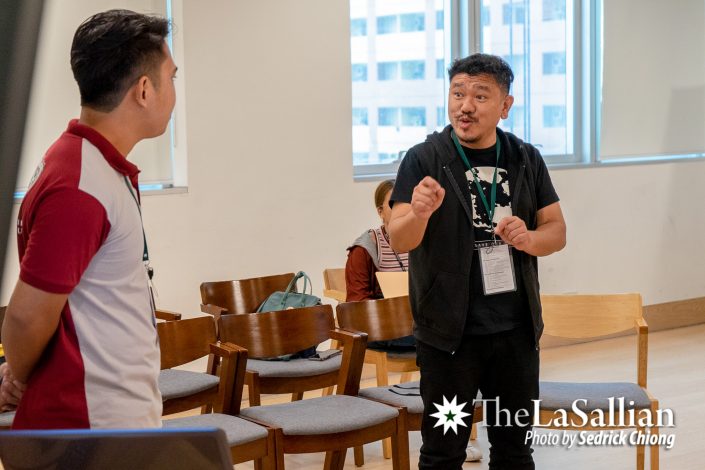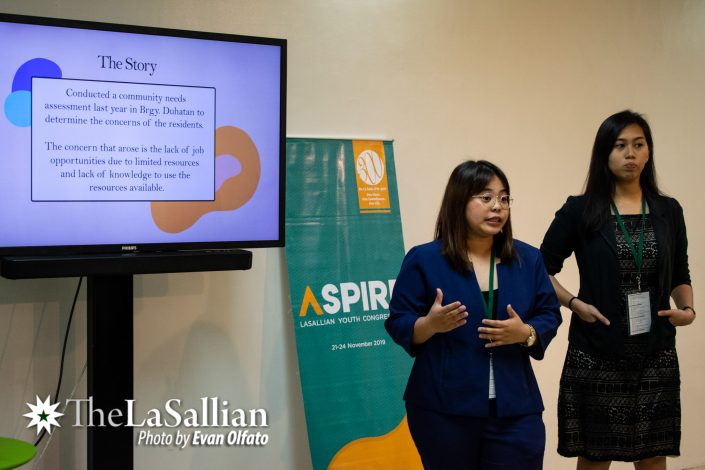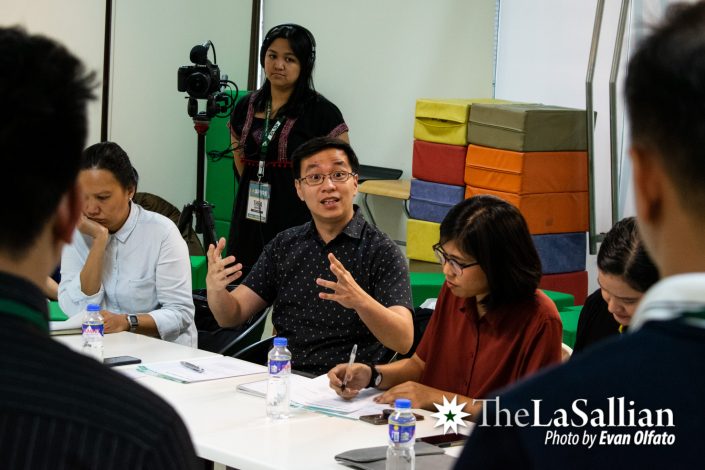ASPIRE: Lasallian Youth Congress, a youth forum that encouraged members of the Lasallian community to initiate social impact, kicked off last November 21. The multi-day event was attended by participants from De La Salle University-Manila, De La Salle Lipa, and La Salle University Ozamiz, who pitched solutions on local community issues such as sustainability, unemployment, and clean water. Aiding them in their advocacy were distinguished mentors and panelists who gave feedback and shared valuable insights on the project pitches.
First venture
Held at the 20th floor of the Br. Andrew Gonzalez Hall, the congress began with a welcoming speech from program head Br. Alexander Diaz FSC from De La Salle Philippines. In his speech, Diaz emphasized the power of St. John Baptist de La Salle’s vision and its relevance to the Lasallian community, saying, “We are gathered in this special moment because we have aspirations to make the world a better place, just like St. La Salle.” Participants then proceeded to their respective breakout sessions, where topics such as formation, responsible citizenship, environment, and leadership were discussed.

The second day of the event, which was held at the De La Salle-College of St. Benilde (DLS-CSB) School of Design and Arts (SDA), commenced in equally high spirits. The program featured distinguished speakers like Jay Jaboneta, the co-founder of the Yellow Boat Hope foundation, who delivered the opening speech. Stressing the impact of social media in promoting one’s advocacy, he reminisced about his own foundation’s desire to share the story of how kids in Layag-Layag, Zamboanga swim to school every day because of a lack of transportation options.
Despite his foundation’s continued success in providing 20,000 kids with over 4,700 boats across the country, Jaboneta remarked that the fight is far from over, for other structural problems like poverty and substandard education still plague Filipino children.
Abigail Cabanilla, director of DLS-CSB’s Hub of Innovation for Inclusion, also spoke of the systemic inequality in our country during the program’s plenary session. With her trailblazing Benilde brand of innovation, she aimed to widen the reach of the Lasallian movement and empower innovators. Calling for people to “disrupt the status quo,” Cabanilla explained how progress should first and foremost be for the marginalized.
Assessing success
One of ASPIRE’s key events were the preparation of project proposals launched by the participants, who were given the chance to showcase their initiatives in front of several panelists for the purpose of critiquing. With this in mind, a few panelists were asked beforehand about their expectations for the students’ projects.
Panelist Alyssa Suico from DAKILA Philippine Collective expressed at the start of the session that she was looking forward to the creative ideas presented by the students, as she hoped for proposals that would offer unique solutions for the communities. “I’m looking for something for creative and bold,” she said. “It’s always a great opportunity to see students or youth who can think outside of the box.”
Russel Patina, Director of Operations of Philippine Business for Social Progress, was also eager to hear about long-term projects from the participants. Emphasizing the importance of sustainability, he appealed for long-term projects that could be directly managed by members of the target community. “A big part of coming up with the program…is the succession na even though you’re no longer there, can the community adopt it and implement it on their own or sustain it?” he put forward.
Initiatives for communities
The critiquing session started with a team from De La Salle Lipa who presented their project entitled eSTYLES: Egg Shell Merchandise Initiatives, an initiative aimed at reducing unemployment and food waste in Brgy. Tambo, Batangas by using solid egg-shell blocks as flooring material.
Another team from De La Salle Lipa presented their proposal Learn it, Earn it: A Social Enterprise on Katsa Pillow Cases, a series of seminars and workshops aiming to give stay-at-home mothers in Brgy. Duhatan, Lipa City a chance to start a livelihood by selling hand-sewn pillowcases made of katsa or cheesecloth.
Also from De La Salle Lipa was the third group who put forward their proposal, Bananaborita: A Livelihood Project for Barangay Pangao, which aims to address the livelihood and unemployment issues in the said barangay through their Bananaborita product—a snack that combines banana and paborita, items that are both abundant in the local community.
Following them were a team of Civil Engineering students from La Salle University Ozamiz who pitched Sag-Ubanan, an initiative which aims to create a water conservation system designed to utilize the community’s existing water source in Purok Matinabangon in order to continuously supply potable water for the local community.
Rounding up the presentations was a team from De La Salle-Red Cross Youth with their F.A.T. Salle initiative, a project aimed at creating a safer Lasallian community by providing basic first aid training for the University’s Senior High School faculty.
A day well spent
With encouraging smiles, the panelists praised the services and products pitched by the participants, but advised them to fine tune the marketability and the financial considerations of their project. After extensive, but well-meaning critiques and suggestions from the panelists, the day ended on a high note, with both participants and panelists leaving the congress carrying new knowledge and ideas.
Peachie Ramos, another participant from De La Salle Lipa, appreciated how the mentoring and critiquing sessions improved their pitches. “Gusto ko po mas ma-defend namin ‘yung project namin kumbaga mas maging innovative po ‘yun at mas ma-sustain talaga ‘yung project, ‘di lang ‘yung pang school, kundi pang buong bansa,” she said.
(I want to be able to defend our project, to make it more innovative and sustainable—not just for a school project, but for the whole nation.)
At the end of it all, ASPIRE provided the participants and panelists alike a platform for discourse, as suggestions and ideas were exchanged between creative, young minds, and older, wiser figures. In doing so, the forum demonstrated how societal issues are more complicated than they may initially seem, and that finding solutions requires the collaborative effort of several people, several sectors with different backgrounds and perspectives—all working toward the same goal of making a difference in society.


